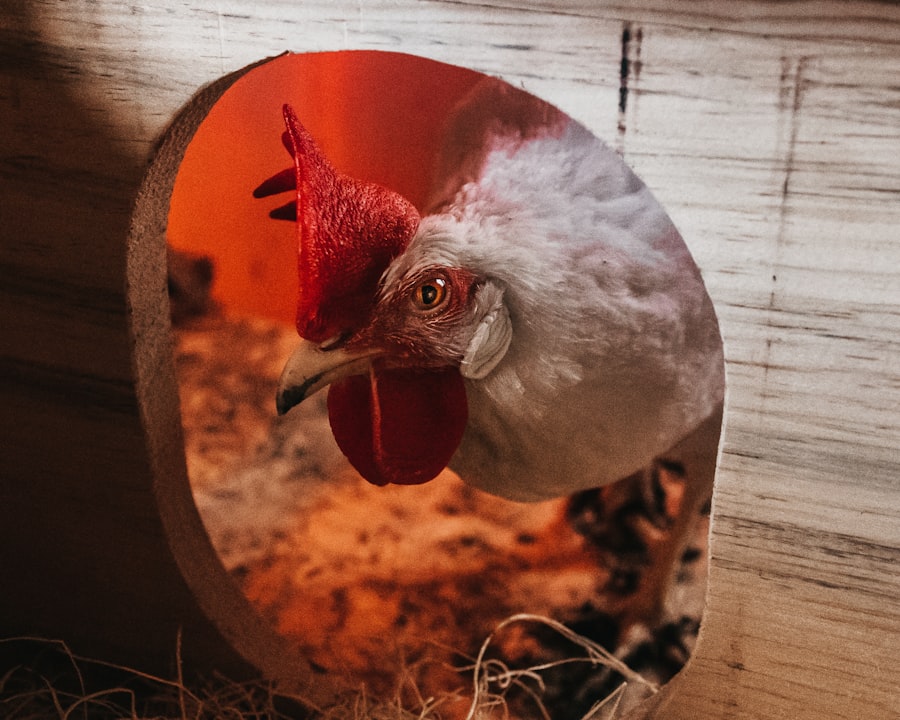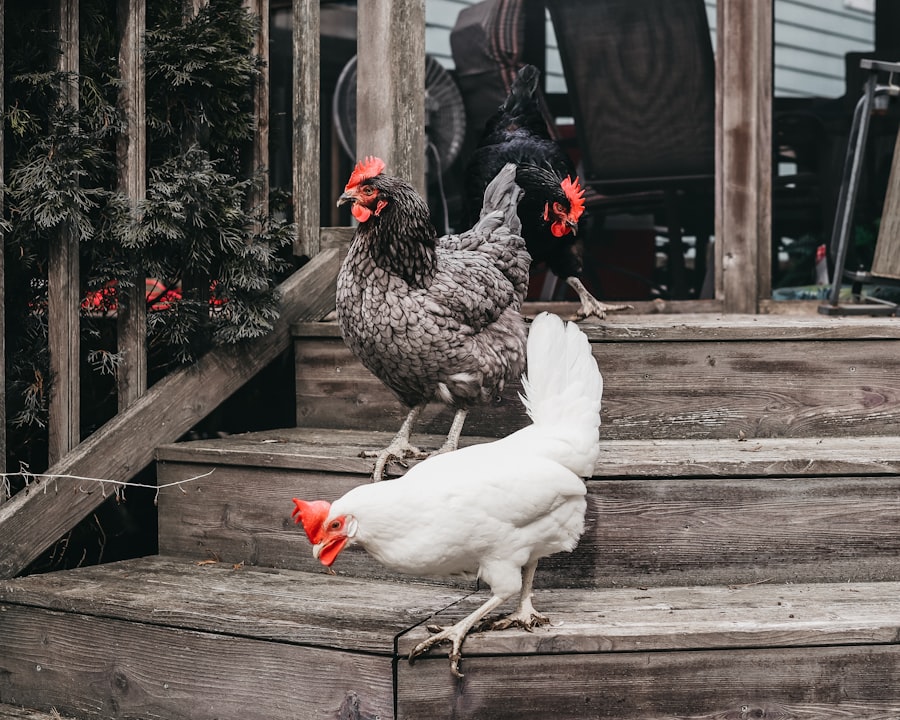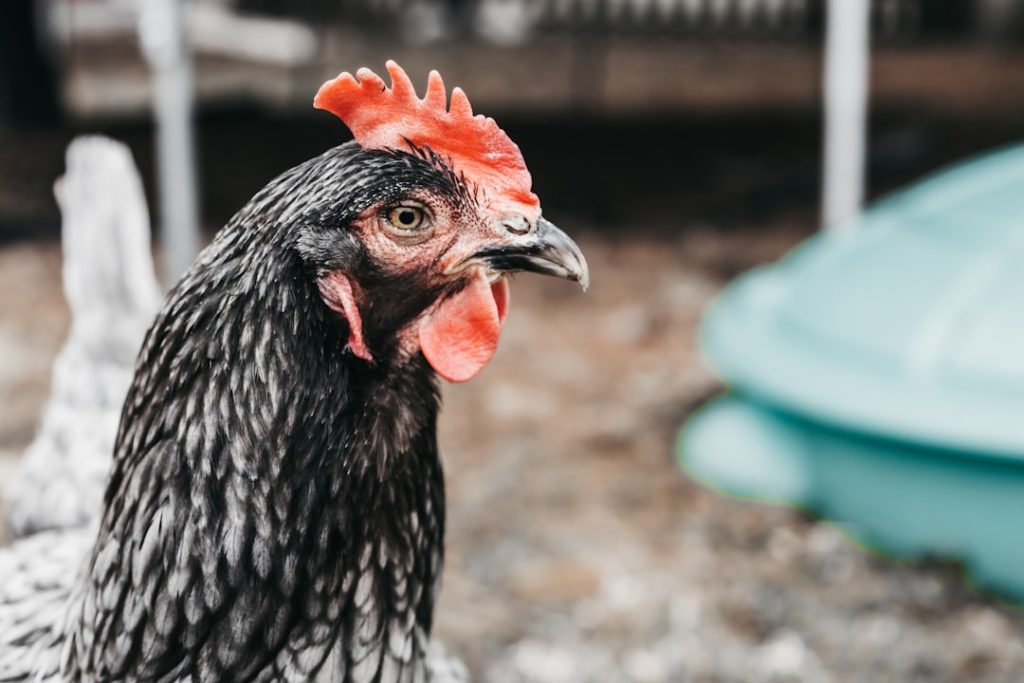When selecting chickens for an urban coop, several factors should be considered. Temperament is crucial, as urban chicken keepers often interact closely with their birds. Breeds known for docility and friendliness include Rhode Island Red, Buff Orpington, and Plymouth Rock.
These breeds are also good egg layers, making them suitable for urban egg production. Climate is another important consideration. For colder regions, cold-hardy breeds like Barred Plymouth Rock and Wyandotte are recommended.
In warmer climates, heat-tolerant breeds such as Leghorn and Sussex are more suitable. The purpose of keeping chickens should also influence breed selection. For high egg production, breeds like Leghorn or Australorp are ideal.
If raising chickens for meat is the primary goal, breeds such as Cornish Cross or Jersey Giant are better suited. By carefully considering these factors – temperament, climate suitability, and intended purpose – urban chicken keepers can select breeds that will thrive in their specific environment and meet their needs.
Table of Contents
- 1 Coop and Run Design
- 2 Feeding and Nutrition
- 3 Space Management
- 4 Health and Hygiene
- 5 Noise and Odor Control
- 6 City Regulations and Permits
- 7 FAQs
- 7.1 1. What are the benefits of keeping chickens in a small garden?
- 7.2 2. How much space do chickens need in a small garden?
- 7.3 3. What are the key considerations for keeping chickens in a small garden?
- 7.4 4. What should be included in a small garden chicken coop?
- 7.5 5. What type of feed and water do chickens need in a small garden?
- 7.6 6. How can chickens be integrated into a small garden’s ecosystem?
- 7.7 7. What are some common challenges of keeping chickens in a small garden?
Key Takeaways
- Consider the climate, space, and purpose of raising chickens when choosing the right breed for your backyard.
- Design a coop and run that provides enough space for the chickens to move around and includes proper ventilation and predator protection.
- Provide a balanced diet for your chickens, including a mix of grains, protein, and fresh fruits and vegetables.
- Manage the space in your backyard to ensure that the chickens have enough room to roam and forage.
- Keep your chickens healthy by regularly cleaning the coop, providing fresh water, and monitoring for signs of illness.
Coop and Run Design
Space and Comfort
First and foremost, ensure that your coop provides enough space for your chickens to roost, nest, and move around comfortably. A good rule of thumb is to provide at least 2-3 square feet of space per chicken inside the coop, and at least 8-10 square feet of space per chicken in the outdoor run. This will help prevent overcrowding and reduce the risk of aggression and disease among your flock.
Ventilation and Natural Light
In addition to space considerations, ensure that your coop provides adequate ventilation and natural light. Proper ventilation is essential for maintaining good air quality and preventing respiratory issues in your chickens, so be sure to include windows or vents in your coop design. Natural light is also important for the health and well-being of your chickens, so try to incorporate windows or skylights into your coop design to allow plenty of sunlight to enter the space.
Enrichment and Stimulation
When designing the outdoor run for your urban chickens, provide plenty of enrichment and stimulation for your flock. This can include things like perches, dust baths, and even a small garden area where your chickens can forage for bugs and plants. Providing plenty of enrichment in the outdoor run will help keep your chickens happy and healthy, and will also reduce boredom and destructive behaviors in your flock.
Feeding and Nutrition

Proper feeding and nutrition are essential for the health and well-being of your urban chickens. When it comes to feeding your flock, it’s important to provide a balanced diet that meets all of their nutritional needs. This can include a commercial layer feed that is specifically formulated for laying hens, as well as supplemental treats like fruits, vegetables, and mealworms.
It’s also important to provide access to clean, fresh water at all times, as dehydration can quickly become a serious issue for chickens. In addition to providing a balanced diet, it’s also important to monitor your chickens’ body condition and adjust their feed accordingly. For example, if you notice that your hens are laying fewer eggs or are losing weight, you may need to increase their feed to ensure they are getting enough nutrients.
On the other hand, if you notice that your hens are becoming overweight or are not laying as frequently, you may need to reduce their feed to prevent obesity and encourage more consistent egg production. It’s also important to consider the impact of seasonal changes on your chickens’ nutritional needs. For example, during the winter months, you may need to increase your chickens’ feed to help them maintain their body temperature and energy levels.
Conversely, during the summer months, you may need to provide extra hydration and electrolytes to help your chickens stay cool and hydrated in the heat. By paying attention to your chickens’ nutritional needs and making adjustments as necessary, you can ensure that your urban flock remains healthy and productive year-round.
Space Management
Space management is a crucial aspect of urban chicken keeping, as it’s important to make the most of the limited space available in an urban setting. When it comes to managing space in your coop and run, there are several strategies you can use to maximize efficiency and provide a comfortable environment for your flock. One effective strategy is to use vertical space by incorporating features like elevated roosts and nesting boxes.
This can help free up floor space in the coop and run, allowing your chickens more room to move around and reducing the risk of overcrowding. Another important aspect of space management is providing adequate space for dust bathing. Dust bathing is a natural behavior for chickens that helps keep their feathers clean and free of parasites, so it’s important to provide a designated area for dust bathing in your coop or run.
This can be as simple as a shallow box filled with sand or dirt, or you can create a more elaborate dust bathing area with natural materials like peat moss or wood ash. By providing a designated area for dust bathing, you can help keep your chickens healthy and comfortable while minimizing the impact on available space. In addition to managing space within the coop and run, it’s also important to consider how your chickens will interact with the rest of your urban environment.
For example, if you have limited outdoor space for a run, you may need to consider using portable fencing or chicken tractors to allow your flock access to fresh grass and insects while still containing them within a small area. By considering these space management strategies, you can create a comfortable and efficient living environment for your urban chickens while making the most of the space available.
Health and Hygiene
Maintaining good health and hygiene practices is essential for keeping your urban chickens happy and healthy. One important aspect of maintaining good health is providing regular veterinary care for your flock. This can include routine check-ups, vaccinations, and parasite control measures to prevent common health issues like respiratory infections, coccidiosis, and mites.
It’s also important to monitor your chickens’ behavior and appearance on a regular basis so that you can quickly identify any signs of illness or injury. In addition to veterinary care, it’s also important to maintain good hygiene practices within the coop and run. This can include regular cleaning and disinfection of the coop, nesting boxes, and roosts to prevent the buildup of bacteria and parasites.
It’s also important to regularly remove soiled bedding from the coop and replace it with fresh bedding to maintain good air quality and reduce the risk of respiratory issues in your flock. Another important aspect of maintaining good health and hygiene is providing access to clean water at all times. Clean water is essential for hydration and digestion in chickens, so be sure to regularly clean and refill waterers to prevent contamination and ensure that your flock has access to fresh water at all times.
By maintaining good health and hygiene practices, you can help prevent common health issues in your urban flock and ensure that your chickens remain happy and healthy.
Noise and Odor Control

Quieter Breeds for Urban Chicken Keeping
One effective strategy for managing noise is to choose breeds that are known for being quieter, such as the Silkie or the Cochin. These breeds are known for their gentle nature and quieter vocalizations, making them a good choice for urban chicken keeping.
Additional Noise Management Strategies
In addition to choosing quieter breeds, there are several other strategies you can use to manage noise in your urban coop. For example, providing plenty of enrichment in the outdoor run can help keep your chickens occupied and reduce excessive vocalizations. You can also consider using soundproofing materials in the coop or run to help minimize noise transmission outside of the space.
Managing Odor in Urban Chicken Coops
When it comes to managing odor in an urban chicken coop, proper waste management is key. Regularly cleaning out soiled bedding from the coop and run can help minimize odors, as can using absorbent materials like straw or wood shavings in the coop. It’s also important to properly compost chicken manure or dispose of it in a responsible manner to prevent odors from becoming an issue in your community.
By using these strategies for noise and odor control, you can help ensure that your urban chicken keeping practices are considerate of your neighbors while maintaining a pleasant living environment for everyone in your community.
City Regulations and Permits
Before embarking on an urban chicken keeping venture, it’s important to familiarize yourself with any city regulations or permits that may apply to keeping chickens in your area. Many cities have specific ordinances governing things like coop size and placement, flock size limits, noise restrictions, and waste management requirements for urban chicken keeping. By familiarizing yourself with these regulations before getting started, you can ensure that you are in compliance with local laws and avoid any potential legal issues down the road.
In addition to city regulations, it’s also important to consider any homeowner’s association (HOA) rules or covenants that may apply to keeping chickens on your property. Some HOAs have specific restrictions on things like coop placement, flock size limits, or even outright bans on keeping chickens within their communities. By understanding these rules before getting started, you can avoid potential conflicts with your HOA and ensure that you are able to keep chickens on your property without issue.
If city regulations or HOA rules do apply to keeping chickens in your area, it’s important to obtain any necessary permits or approvals before getting started. This may include things like obtaining a zoning variance for keeping chickens on residential property or obtaining a special use permit for operating an urban chicken coop as a small business. By taking these steps before getting started, you can ensure that you are in compliance with local laws and regulations while enjoying the benefits of urban chicken keeping in your community.
In conclusion, choosing the right breed of chickens for an urban coop involves considering factors such as temperament, climate suitability, purpose (egg production or meat), feeding them properly with balanced nutrition is essential for their health; managing space efficiently by using vertical space or providing adequate dust bathing areas; maintaining good health by providing regular veterinary care; managing noise by choosing quieter breeds or using soundproofing materials; controlling odor by proper waste management; understanding city regulations or permits before starting an urban chicken keeping venture is crucial for compliance with local laws.
If you’re considering keeping chickens in a small garden, you may also be interested in learning about how long it takes for chicken eggs to hatch naturally. This article from Poultry Wizard provides valuable information on the incubation process and what to expect when hatching your own chicks. Check it out here.
FAQs
1. What are the benefits of keeping chickens in a small garden?
Keeping chickens in a small garden can provide several benefits, including a fresh supply of eggs, natural pest control, and the production of high-quality fertilizer for the garden.
2. How much space do chickens need in a small garden?
Chickens require a minimum of 2-3 square feet of space per bird in a small garden. It’s important to provide enough space for them to roam and forage while still maintaining a manageable size for the garden.
3. What are the key considerations for keeping chickens in a small garden?
Key considerations for keeping chickens in a small garden include providing adequate space, ensuring proper ventilation and sunlight, managing waste effectively, and considering local regulations and neighbors’ concerns.
4. What should be included in a small garden chicken coop?
A small garden chicken coop should include roosting bars, nesting boxes, proper ventilation, and predator-proofing measures. It should also have easy access for cleaning and egg collection.
5. What type of feed and water do chickens need in a small garden?
Chickens in a small garden require a balanced diet of commercial chicken feed, supplemented with kitchen scraps and occasional treats. They also need access to fresh, clean water at all times.
6. How can chickens be integrated into a small garden’s ecosystem?
Chickens can be integrated into a small garden’s ecosystem by allowing them to forage for insects and weeds, and by using their manure as a natural fertilizer for the garden. They can also help aerate and turn over the soil.
7. What are some common challenges of keeping chickens in a small garden?
Common challenges of keeping chickens in a small garden include managing waste and odor, preventing damage to garden plants, and addressing potential conflicts with neighbors or local regulations.
Meet Walter, the feathered-friend fanatic of Florida! Nestled in the sunshine state, Walter struts through life with his feathered companions, clucking his way to happiness. With a coop that’s fancier than a five-star hotel, he’s the Don Juan of the chicken world. When he’s not teaching his hens to do the cha-cha, you’ll find him in a heated debate with his prized rooster, Sir Clucks-a-Lot. Walter’s poultry passion is no yolk; he’s the sunny-side-up guy you never knew you needed in your flock of friends!







